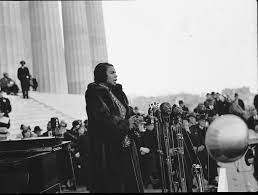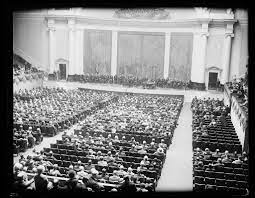The Complicated Legacy of NSDAR and Marian Anderson

Note: I am a member of the Daughters of the American Revolution and wrote this article for my chapter’s newsletter.
The Daughters of the American Revolution has a complicated legacy regarding American contralto, Marian Anderson (1897-1993). Raised in Philadelphia, Anderson showed her musical talent early on, but because she was black, she was turned down by the all-white Philadelphia Musical Academy (now the University of the Arts School of Music). Unstoppable, her first big break came at a singing competition sponsored by the New York Philharmonic. This win sparked Anderson’s long career, with her singing everything from spirituals to opera at major venues in the United States and Europe.
Chances are, as a DAR member, you will be, or have already been, asked about Marian Anderson and how the DAR refused to let her perform at Constitution Hall because of her race. It will be beneficial for you to explore the DAR website, which has a Marian Anderson section with history, statements, and links to valuable resources. The official DAR statement seeks to make it clear that today’s organization practices non-discrimination and encourages diversity. The DAR deeply regrets the decision not to let Anderson perform at Constitution Hall in 1939.
The fact that the DAR is still apologizing is proves that it can take decades to build goodwill—and just an instant to destroy it. It can take a very long time to recover from damaged goodwill, if ever. In the case of our DAR, we are still rebuilding our reputation, and we will likely continue for as long as the organization is in existence.
In addition to the many resources on the DAR website about Marian Anderson is a link to a 2022 PBS documentary, Marian Anderson: The Whole World in Her Hands. The documentary’s description states that Anderson is best known for her concert on the steps of the Lincoln memorial in front of an integrated group of 75,000 and for millions of radio listeners. It also states that the location was chosen after the DAR refused to allow Anderson to perform at Constitution Hall because of its “whites only” policy.

The Policy’s Origin
How did this policy originate? One of the resources on the DAR website is the image of a typewritten statement by the Constitution Hall manager, Fred. E. Hand. In “Facts Concerning the Management of Constitution Hall Dating from 1929 to 1940,” Hand attempts to explain the Marian Anderson matter in a chronology.
According to Hand, prior to the first-ever concert in Constitution Hall in 1929, the DAR Executive Committee set aside a small group of seats for “negroes” who wished to attend concerts. As far as Hand knew, this was, “the first time that any theater or auditorium in Washington, catering to a white clientele, recognized that negroes should be permitted to hear world-renowned artists.”
The DAR Executive Committee likely thought it was doing a good thing by allowing a small number of African Americans to sit in Constitution Hall, but when the Hampton Institute Choir was set to perform in the theater in 1931, it followed that a large number of blacks would want to attend. The contract stated that only 200 seats could be sold to blacks and in only two sections, up in the “Tiers.” With pressure, the DAR ended up removing restrictions as to seating locations.
Criticism and Defense
A few days after the concert, an open letter, signed by the NAACP (National Association for the Advancement of Colored People) in the New York Tribune severely criticized the DAR for “not cooperating with the Negroes,” and according to Mr. Hand, the letter was quite unfair. The bad publicity encouraged more African American organizations to ask for booking dates, and these groups were not willing to restrict the sale of tickets to blacks, so on March 23, 1932, the DAR Executive Committee instructed the manager of Constitution Hall to insert “White Artists Only” into all contracts.
In 1936, Howard University requested use of Constitution Hall for a recital by Marian Anderson, and Fred Hand suggested they contact the National Board of Management, National Society, Daughters of the American Revolution. Hand heard no more from Howard University until January of 1939 when representatives asked for a date that had been booked by someone else for more than a year. When Howard representatives suggested other dates, Hand cited the 1932 “whites only” ruling and again suggested they contact the National Society for a waiver. What followed instead was a media storm of criticism against the DAR.
Hand asserted that it was only at “commercially operated events” that the DAR had ever placed restrictions on the seating of blacks in Constitution Hall. “At conventions, mass meetings, etc., negro delegates and participants in programs are given the same treatment as any white member of an audience and only recently a colored clergyman made a prayer from our stage at a religious mass meeting.”
Many organizations appealed to the DAR to change its policy, and Eleanor Roosevelt, who was DAR’s shining star, even resigned from the organization. She usually welcomed the Daughters members to the White House during the annual Continental Congress, but in 1939, she was absent due to a commitment to her west-coast grandson to attend his birthday party.
At the DAR Continental Congress in April of 1939, President General Sarah Corbin Robert, defended the DAR’s actions over the prior months. She stated that the 1932 ruling was a result of “unpleasant experiences in attempting to go contrary to conditions and customs existing in the District of Columbia.” She said that only the national board of management could rescind the rule and by the time the board met on February 1, “the real question had become so involved with entanglement that it could not be considered alone.”
Mrs. Robert stated that the rule was “as a result of actual experience.” The DAR had apparently attempted to go “contrary to conditions existing here” and had been widely criticized for not co-operating with local customs. The rule was made because, “experience showed the society could not go contrary to or further than the customs existing in the city in which its properties were located.” Then she said this was not a problem for the DAR alone, and that when the city worked out its issues, the DAR would go along willingly to adapt to “practices and customs in accordance with the highest standards of the community.”
Mrs. Robert denied that discrimination was involved the board’s decision. She said the DAR “has consistently through its nearly 50 years been a friend of and has worked for many minority groups.”
Lessons Learned
But, just like that, the goodwill built by the DAR over 50 years was severely damaged by trying to stay out of trouble with the community. Perhaps if the women had felt a little of the gumption, of those who had stood up to an entire country more than one hundred years prior, they would have faced criticism by segregationists, but they would have found themselves on the right side of history. We’d be calling them heroines instead of apologizing for them.
It’s not easy to be in positions of leadership, and the women who were running the DAR in the first half of the twentieth century surely had the very best intentions. Sometimes the decisions we make have repercussions that can last a long while, even after we’re gone. But today’s DAR is clearly working to overcome the unfortunate decision with Marian Anderson and rebuilding its goodwill.
Postscript:
Marian Anderson endured much discrimination during her life, but she was well-respected and regarded as a gracious woman. One snub from the DAR was not enough to make her hold a lifelong grudge against the organization. In 1942, Marian Anderson performed in a series of war-relief concerts at Constitution Hall and for the next twenty years, she performed at the hall numerous times, including as a stop on her farewell tour.




Leave a Reply